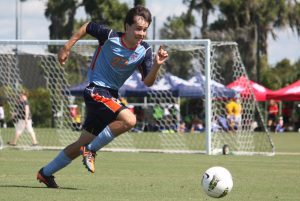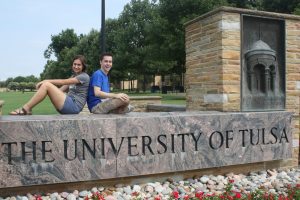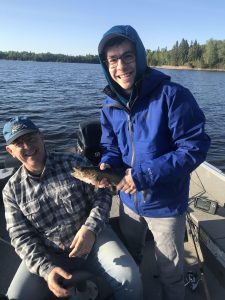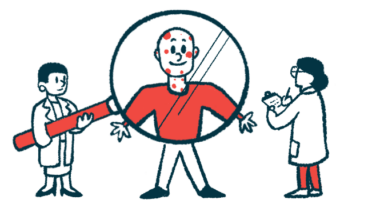‘LEMme Tell Ya’ Patient Stories in Their Own Words: Will Schuller

Five years ago, Will Schuller was thoroughly enjoying his senior year in high school when he began experiencing symptoms of Lambert-Eaton myasthenic syndrome (LEMS). He was in the marching band, running 25 miles a week, and taking four Advanced Placement classes and one honors class when his life suddenly changed.
Will is now a graduate of the University of Tulsa with a degree in mechanical engineering and works in Kansas City, Missouri. Despite the challenges he faces as a young adult with LEMS, he doesn’t let it slow him down. Here is Will’s story, in his own words:
DD: What changed for you in the fall of 2014?
When I started my senior in high school, I was in great shape. I first knew something was wrong when I began losing time when running. My legs felt weak and my mouth would get dry. At first I dismissed it as growing pains, but I eventually knew I needed to see a doctor. My symptoms worsened through the fall as I bounced from specialist to specialist. By December, I didn’t have enough energy to make it through the school day. My calculus teacher called my mom and told her it was time to pull me out of school. When Christmas arrived, I was in a wheelchair.
Describe how your first visit to the Mayo Clinic was pivotal in your treatment and management of LEMS.
My neurologist promised me he would figure out what was wrong, but test after test kept coming back normal. We were making plans to go to the Mayo Clinic when the results of my paraneoplastic panel came in. My doctor called my parents three days after Christmas to tell us I most likely had LEMS.
It took about six weeks for him to diagnose me. That seemed like forever at the time, but as I hear other people’s stories, I now realize how lucky I was. My body was rapidly deteriorating, and the quick diagnosis no doubt speeded my recovery. My neurologist had never seen LEMS before, so he encouraged me to go to Mayo.
The Mayo team confirmed the diagnosis and immediately started me on an investigational drug called 3,4 diaminopyridine (DAP). DAP has since received FDA approval and is now called Ruzurgi (amifampridine). When I received my first dose, it was nothing short of a miracle. In just 45 minutes, I went from barely walking to doing deep knee bends. I literally skipped out of the examination room. I returned home with a treatment plan which included daily medication, twice yearly Rituxan (rituximab) infusions and physical therapy. I still had a long way to go, but I felt like I had gotten my life back.
How did you manage the rigorous college course expectations to become a mechanical engineer?
I started college eight months after being diagnosed. By then I had much of my strength back, but I still worried. What if I get sick again? The university worked with me. I got a centrally located, first-floor dorm room and early class selection so I could shorten my walks and build in breaks. Fortunately for me, I don’t have any other major health issues, so my LEMS remained manageable with medication.
Because of my weakened immune system, it takes me longer to rebound after getting sick. Staying healthy during flu season is always a challenge. I didn’t broadcast my illness, but my close friends and a few professors knew. My sister was there, which helped a lot. Also, my parents were a four-hour drive away. All of these things helped me manage the difficult engineering courses as I continued to build back my strength.
What words of wisdom do you have for other young adults starting their lives and careers with a chronic illness?
Going from high school to college is very different than going from college to the working world. A full-time job can be exhausting for a person fighting a chronic disease. My biggest piece of advice is not to overdo. Stress worsens LEMS symptoms. If you find yourself so busy that you begin to lose energy, it is important to pull back. Make sure to get enough sleep, eat healthy, and take naps or breaks when needed. You have to learn to recognize when you need to say no to a social outing. You may have to adjust your work schedule. Always listen to your body.
***
Note: Lambert-Eaton News is strictly a news and information website about the disease. It does not provide medical advice, diagnosis, or treatment. This content is not intended to be a substitute for professional medical advice, diagnosis, or treatment. Always seek the advice of your physician or other qualified health provider with any questions you may have regarding a medical condition. Never disregard professional medical advice or delay in seeking it because of something you have read on this website. The opinions expressed in this column are not those of Lambert-Eaton News or its parent company, Bionews Services, and are intended to spark discussion about issues pertaining to Lambert-Eaton myasthenia.










Regina T Cherskov
Dawn,
I was diagnosed with SCLC when my LEMS was diagnosed. This was in 2015. I had chemo and radiation at the same time. a year later, I had another round of Chemo at Emory Univ. I have quarterly CT scans, and my oncologist calls me her miracle patient. The cancer is still there, but not growing. I feel very lucky to have made it this far. I take each day at a time, thanking God for the extra time. I take Firdapse and am thinking of switching to Ruzulia.
Dawn DeBois
Regina,
I'm so glad you are doing so well and considered your oncologist's miracle patient! LEMS patients are fortunate to have options for treatments. That wasn't the case when you were diagnosed. I pray you continue to have many great days ahead. Please keep me posted!
~Dawn